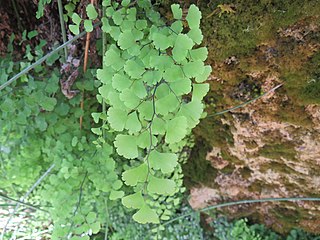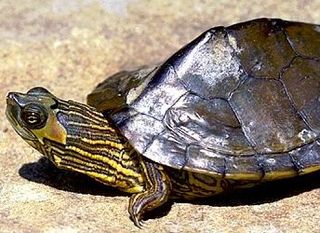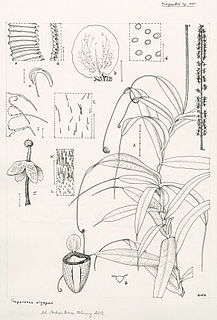
The International Union for Conservation of Nature (IUCN) Red List of Threatened Species, founded in 1964, is the world's most comprehensive inventory of the global conservation status of biological species. It uses a set of precise criteria to evaluate the extinction risk of thousands of species and subspecies. These criteria are relevant to all species and all regions of the world. With its strong scientific base, the IUCN Red List is recognized as the most authoritative guide to the status of biological diversity. A series of Regional Red Lists are produced by countries or organizations, which assess the risk of extinction to species within a political management unit.

Adiantum capillus-veneris, the Southern maidenhair fern, black maidenhair fern, maidenhair fern, and venus hair fern, is a species of ferns in the genus Adiantum and the family Pteridaceae with a subcosmopolitan worldwide distribution. It is cultivated as a popular garden fern and houseplant.

Plantaginaceae, the plantain family, is a family of flowering plants in the order Lamiales. In older classifications it used to be the only family of the order Plantaginales, but numerous phylogenetic studies, summarized by the Angiosperm Phylogeny Group, have demonstrated that this taxon should be included within Lamiales.

The Chinese pond heron is an East Asian freshwater bird of the heron family, (Ardeidae).

The conservation status of a group of organisms indicates whether the group still exists and how likely the group is to become extinct in the near future. Many factors are taken into account when assessing conservation status: not simply the number of individuals remaining, but the overall increase or decrease in the population over time, breeding success rates, and known threats. Various systems of conservation status exist and are in use at international, multi-country, national and local levels as well as for consumer use.

Luronium natans is a species of aquatic plant commonly known as the floating water-plantain. It is the only recognized species in the genus Luronium, native to western and central Europe, from Spain to Britain to Norway east to Ukraine.

Streblorrhiza speciosa was a perennial shrub endemic to Phillip Island. A species of legume in the family Fabaceae, and the sole species of the genus Streblorrhiza, it is now presumed extinct.

Podocarpus laetus is a species of conifer in the family Podocarpaceae, commonly known as Hall's tōtara, mountain tōtara or thin-barked tōtara. Previously known as Podocarpus hallii and Podocarpus cunninghamii, in 2015 it was realised that the much earlier name P. laetus has priority. Its common name results from the species being named after J. W. Hall, a New Zealand pharmacist.
Callitriche christensenii is a species of plant in the family Plantaginaceae. It is endemic to Saint Helena. Its natural habitats are rivers, freshwater marshes, and freshwater springs.

Alopecurus aequalis is a common species of grass known as shortawn foxtail or orange foxtail. It is native to much of the temperate Northern Hemisphere from Eurasia to North America. It is most commonly found in areas near fresh water, such as the margins of ponds and ditches.

An endangered species is a species that is very likely to become extinct in the near future, either worldwide or in a particular political jurisdiction. Endangered species may be at risk due to factors such as habitat loss, poaching and invasive species. The International Union for Conservation of Nature (IUCN) Red List lists the global conservation status of many species, and various other agencies assess the status of species within particular areas. Many nations have laws that protect conservation-reliant species which, for example, forbid hunting, restrict land development, or create protected areas. Some endangered species are the target of extensive conservation efforts such as captive breeding and habitat restoration.

Callitriche is a genus of largely aquatic plants known as water-starwort. Previously, it was the only genus in the family Callitrichaceae. However, according to the APG II system this family is now included in the Plantaginaceae. The family name Callitrichaceae retains its status as nomen conservandum.

The Alabama map turtle is a species of emydid turtle endemic to the southern United States. Differentiation from other turtle species includes a black stripe running down the center of its back with knobs extruding from it, but these projections wear down with age. T.H. Bean and L. Kumlen first collected the Alabama map turtle in July 1876 from a lake near Montgomery, Alabama. Type locality for this species is Montgomery County, Alabama. Baur described and named the Alabama map turtle in 1893. The genus Graptemys includes nine species of mostly aquatic turtles.
Quercus hinckleyi, commonly called Hinckley oak, is a rare species in the white oak group. It has a restricted range in the Chihuahuan Desert of the southwestern United States and northern Mexico. In the US, it occurs in only two counties in southwestern Texas and is federally listed as a threatened species.

Nepenthes alzapan is a tropical pitcher plant native to the Philippine island of Luzon. It is known from only a handful of herbarium specimens collected in 1925 from submontane mossy forest at an elevation of 1800 m above sea level. It is closely allied to N. bellii and has similarly diminutive pitchers.

Iris boissieri, is a species in the genus Iris, it is also in the subgenus Xiphium. It is from Europe, mainly Spain and Portugal. It has blue-purple flowers with a yellow beard.

Callitriche brutia, the pedunculate water-starwort, is a submerged/floating-leaved aquatic plant in the family Plantaginaceae. It is found in aquatic environments in Europe.

The Mediterranean long-eared bat, also known as Kolombatovic's long-eared bat, is a species of vesper bat ranging from Italy east through the Balkans east to Syria, and south to Jordan.
Allium akirense is a species of flowering plant in the family Amaryllidaceae endemic to Israel. Is it closely related to Allium qasyunense. It is diploid having 14 chromosomes.















